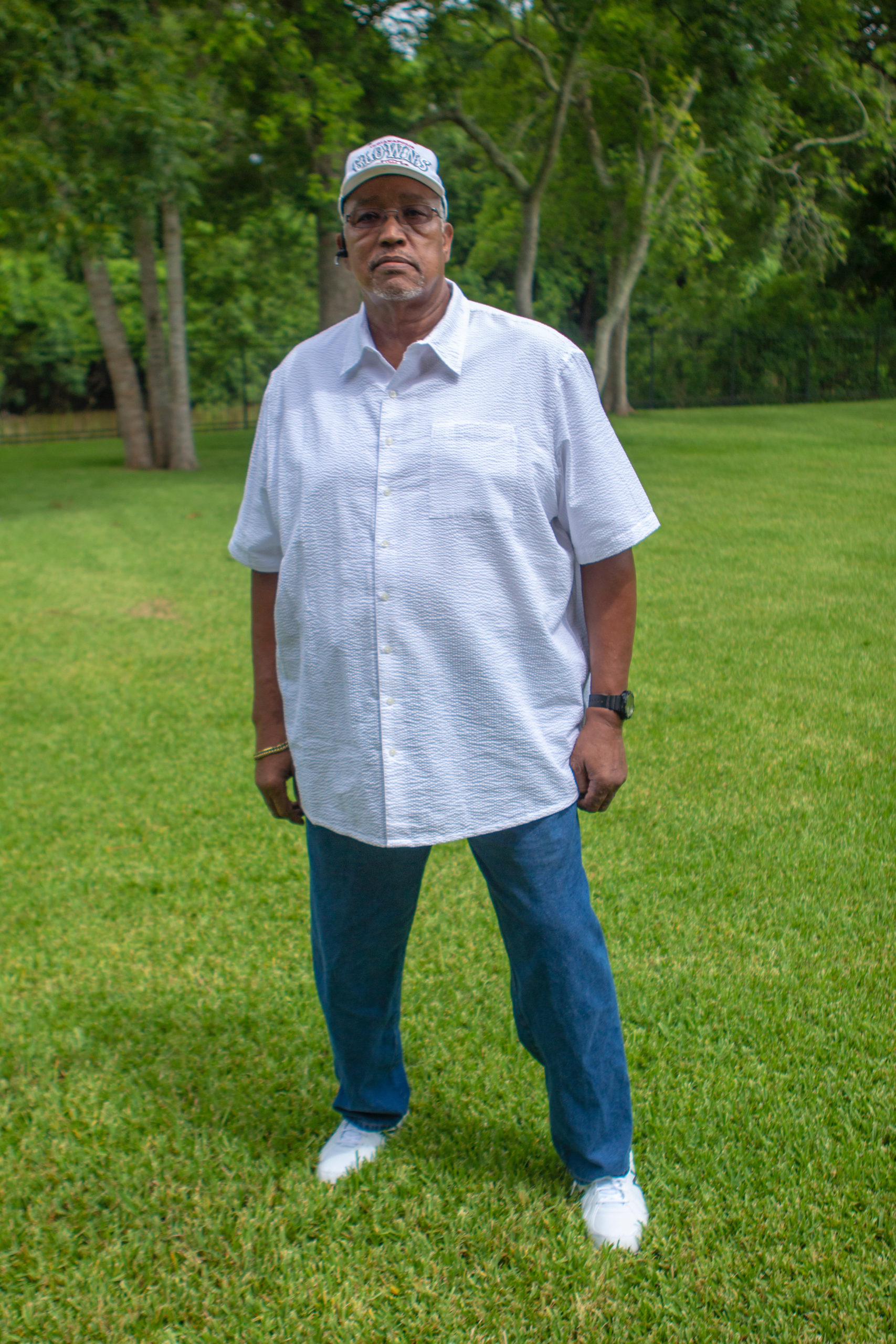
Photo credit: Dale Lamar
In 1993, 11 years after a stroke ended his promising MLB career, J.R. Richard, one of MLB’s dominant flamethrowers, was sleeping on a piece of plywood, living under a bridge 8 miles from the Astrodome where he once electrified crowds and flashed his golden arm for tens of thousands as the ace of the Houston Astros pitching staff.
It was an inconceivable and drastically different place, not only in location but in social standing for a 6-foot-8 220-pound franchise pitcher, who from 1976-1980 was probably the best mound marauder in all of professional baseball.
We’re talking about a gas pump who mowed down 15 Giants, including Willie Mays three times in his professional debut at the age of 21 in 1971. Iconic ballers Dale Murphy, Johnny Bench and Joe Morgan considered Richard the toughest pitcher they ever faced.
Fast forward to 2020, and the 70-year-old vessel for worship, prayer and public service can fondly look back on his life’s journey without getting held back by regrets or bitterness.
“That meant a great deal to me,” Richard tells CORE Magazine in his Me2Me interview, reflecting on his younger self. “When you talk about …some of the greatest hitters in the game giving JR Richard props for being one of the better pitchers…I cherished that greatly because it was coming from a high caliber of hitters who knew what they were talking about.”
As far as the hitters that made JR Richard’s heart go pitty-pat?
“They ain’t been born yet,” Richard said with a straight face and no bluff.
Richard is now the sagacious and calm senior citizen with a treasure chest of life’s lessons to share, but he still has that feisty, competitive streak that fueled his shooting star MLB dominance.
He faced some of the most prolific hitters in history, and “I respected all of ‘em, but I didn’t care about none of them,” said Richard. “I was the baddest lion in the valley, and you’re not going to beat me. That was my mentality.”
Black Ace at His Peak
From 1976-80, Richard was the best…#period. The Vienna, Louisiana native averaged 18 wins per season. In 1976, he became an official “Black Ace” by winning 20 games utilizing a 103 mph fastball that, according to Richards, “made his idol Bob Gibson jealous.”
Richard won the K-crown in both 1978 and 1979, extinguishing 616 batters in those seasons.
By 1980, Richard was gaining fame and celebrity and staying true to the principles instilled in him by his Dad Clayton. He was raising the bar for pitching excellence as the All-Star game starter sporting a 10-4 record and 1.96 ERA.
“When I was growing up as a little child,” said Richard, “my father and I were real close. My father was my biggest influence, and that’s where all my excellence comes from – him. He said always be better to your kids than I was to you and always have more for them than I had for you, and somehow that translated to “be the best you can” be, so that’s been my inspiration point. I worked hard every day to achieve that.”
Stroke of Bad Luck, Victim of the Times
An insatiable drive to annihilate the competition allowed Richard to perform at an elite level, despite often complaining of dizziness, blurred vision, sensitivity to sound and arm fatigue.
Doctors eventually found a blockage in the artery of Richard’s right shoulder but didn’t feel like it was “serious enough” for surgery. In fact, the Astros organization and local media treated Richard as if he was making it all up. They attributed his problems to rumors of cocaine abuse, laziness and jealousy towards other pitchers.
Richard kept pitching through it. The Astros kept discounting his personal concerns about his own body. This blatant disregard for Richard’s wellbeing resulted in the worst possible scenario for the Astros and their fearless ace.
On July 30, 1980, Richard collapsed from a stroke while having a toss with another teammate.
Blood flow in the major arteries on the right side of Richard’s neck had been completely restricted. He was rushed to the hospital, and life-saving emergency surgery was performed to resuscitate blood flow to his brain.
The damage, however, was already done. Further tests revealed that it was the third stroke Richard had suffered from arterial blockages in his right arm. The official diagnosis was arterial thoracic outlet syndrome.
Richard was devastated, to say the least. “I had previously pitched five years in a row without missing a start, and I said something is wrong…I knew something was wrong,” he recounts. “The doctors said there’s nothing wrong, it’s in your head. So I was pretty disappointed with the organization.”
Richard unwisely kept pitching, and after the stroke, the phenom who didn’t lose a single game in high school was physically unable to continue his brilliant career. Richard hung his cleats up in 1982 after a failed comeback.
No Time for Regrets
Previous doubters were reportedly shocked and embarrassed by the seriousness of Richard’s injury. Their sympathy came too late.
The $1.2 million settlement he reportedly got from the Astros for his misdiagnosis was also too little too late. J.R. reportedly lost over $300,000 in a business scam and roughly $700,000 in a nasty divorce.
Richard disputes the amount of money he reportedly received from the Astros and the 11 million dollars he allegedly made in his MLB career, but years later, the question remains:
Was the younger J.R. Richard a victim of drugs, racism or ambition?
He says his drug use is overstated, and his Blackness deprived him of the care and concern deserving of a valuable ace who was the team’s second overall selection in the 1969 MLB Draft.
“I don’t think that [it was racism]… I know that, and it was blatant and obvious to everyone that there was racism going on,” Richard insists. “Because I think that if I had been White in that position, things would have been totally different.”
Richard got a raw deal. And it got worse as he navigated through life’s turbulent waters and struggled to find his pathway to heaven, but Richard’s fighting spirit didn’t allow him to waste his life away in a bottle of regrets.
“Life carries on, and things are going to be what they’re going to be,” Richard tells CORE magazine. “You just have to keep doing what you’re doing.”
And while he credits racism and injury for his MLB demise, Richard doesn’t believe that bigotry is an impediment to high achievement. Black people have risen out of slavery to achieve incredible things, never using race as an excuse for failure.
That is why, says Richard, the recent movement in this country demanding racial justice and social equality is “essential.”
“The Bible says one time Jesus went into the synagogue and turned over a table, Richard said. “At some point, if you kick a dog around for so long, they will turn around and bite you. It’s been 400 years that the Black man has been desecrated, and bottom line, it’s time for a change.”
Defeating Social Injustice Begins With Accountability
“If you sit there and do nothing, nothing will change. Change starts with yourself,” Richard said, drifting into a sermon as if he was at the pulpit in front of the congregation. “You gotta get yourself together first.”
In addition to demanding change from non-people of color, Richard says, Black people have to do a better job of empowering their own personal destinies and uplifting their own communities.
“How come we aren’t also marching on Black folks killing Black folks and getting the drug dealers and liquor stores out of our neighborhood?” Richard asked.” Why not march for something that’s going to affect the next generation of people?”
Sure, Richard has all of the answers now. That’s what happens when a Black man is given a chance to evolve in life. Richard understands that he walks alone, but can’t do it alone.
“We all need somebody that’s bigger than we are. We’re not that large.”
While living under that bridge in Houston, Richard encountered Reverend Floyd Lewis of the New Testament Church of South Houston.
With the good reverend’s love, guidance and assistance, Richard overcame his homelessness and found God.
He rose out of the depths of despair and entered the ministry. He and Lewis teamed up with a common mission to help the homeless, mentor the youth and redirect lost souls. Richard also was influential in helping to establish baseball programs for children in Houston. He got his life back by sharing it with others.
“I’m still sharing my life with others and letting them know that you can be anything you want to be,” Richard said. “First thing you gotta do is change your thinking, which is going to change your attitude and your perception of life. And I know you can’t do it all by yourself. If we could, then we’d all be saved, but God didn’t plan it like that.”
Legendary Advice
The young J.R. Richard was like a gifted bull in a china shop, refusing to be outdone, unaware that his mortality was right around the corner. Looking back, he says he’d give three pieces of advice to his younger self and today’s young African-American players with diamond dreams:
Be the Best you can be, and you can be all you want to be. It’s in your hands.
Extra work never hurt anybody. Hard work always pays off, sometimes you may do hard work and not get rewarded for it, but you don’t give up. Keep on striving.
Anything you want in life is already out there. You just have to get up and go get it and quit blaming other people for your mistakes in life.
Healing Through Faith
Richard built a new life for himself based on faith, generosity and improving the world, but he still maintained his passion for baseball. He eventually reconciled with the Astros organization, returning for an Old Timer’s game in 1995.
“I have never been bitter,” Richard says.” If I had been bitter, that bitterness would have caused me to look back and say the world owes me something, but the world doesn’t owe you anything.
JR Richard has done his best, and “I tried to help everybody. God doesn’t just bless you for you. He blessed me so I can help other people. I’m going to be the best man I can be from a Godly perspective, not from my perspective, because I’ll mess it up every time.“
Amen to that.
Remembering Coach J.R. Richard
J.R. Richard died August 5, 2021 in a Houston hospital at the age of 71. Richard was hospitalized last month in mid-June with complications from COVID-19. J.R. will forever be remembered as an intimidating figure on the mound and as one of the greatest pitchers in club history. He stood shoulder to shoulder with club icons Larry Dierker, Joe Niekro and Nolan Ryan, to form a few of the best rotations in club history. You will FOREVER and a day be missed. Below is the OFFICIAL GoFundMe page for the ICON and any donations or gifts of love will be greatly appreciated and will go directly towards the burial.
CLICK HERE to donate to his GoFundMe page.

 CLICK HERE
CLICK HERE
